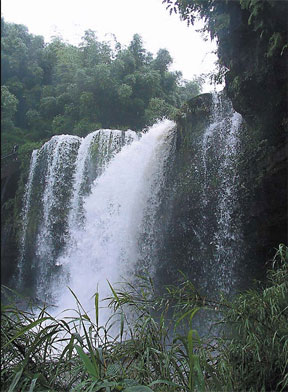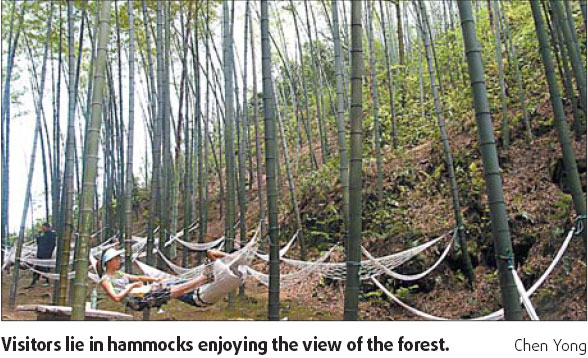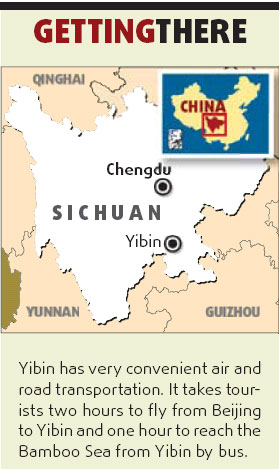Yibin in Sichuan province is a city of many unique features. For ordinary Chinese, it is synonymous with Wuliangye, a famous liquor that has been produced for more than 600 years. Besides Wuliangye, there are another 1,000 distilleries in the city, making it China's largest liquor producer.
Walking in the groves is an invigorating experience. Jing Aiping
For geographers, it is the first city to be found in the upper reaches of the Yangtze River.
For archaeologists, the 200 hanging coffins of the ancient Bo people scattered in caves in Gongxian county are a continuing mystery. It remains unclear why or who placed the coffins in the 26- to 200-m-tall cliffs. Yibin was inhabited by the Bo people in large numbers before the Qin Dynasty (221-206 BC). Archaeologists believe that there are more hanging coffins in Yibin than anywhere else in the world.
For nature-lovers and tourists, the city is best known for its 120-sq-km bamboo forests, commonly known as the Bamboo Sea.
Hailed as one of the country's 10 most beautiful forests, the Bamboo Sea, where the average temperature is 15 C in winter, is an ideal tourism destination at this time of the year when many parts of the country are covered with snow and ice.
My recent journey to the Bamboo Sea which covers Changning and Jiang'an, two counties under Yibin's jurisdiction, started from Chengdu, the capital of Sichuan in Southwest China.
The forest is composed of more than 500 bamboo-covered hills in addition to lakes, streams and waterfalls.
Walking along a corridor of lush bamboo as tall as 10 m at the entrance to the Bamboo Sea was an immediately invigorating experience and did not, in the least, feel cold.
"The Bamboo Sea has become a popular tourist attraction after the Oscar-winning Crouching Tiger Hidden Dragon was partly shot here in 2001," says Yang Min, a local guide.
Captivating waterfalls and lively spring scenery can be found in Yibin's Bamboo Sea. Huang Zhiling
As winter is the sluggish season for tourism, there were very few visitors to the tranquil Bamboo Sea. We could only hear birds singing, streams murmuring and the echo of our own footsteps while walking in the groves.
Beside a bubbling stream, I was excited to see two bamboo trees thriving in the narrow cleft of two huge rocks.
"Bamboo shoots are so powerful that they can penetrate rocks and topple stones as they grow," Yang says.
"A bamboo shoot can grow as much as half-a-meter in a day in spring under the right conditions."
In addition to the beautiful natural scenery, the Bamboo Sea boasts many sites of historic and cultural significance. The bets known of these are the Celestial Dwelling Cave and the Xijiashan Residence.
Built in 1259, the cave on a precipitous cliff is known for a combined Taoist and Buddhist temple.
Here, tourists can see the Buddha sitting together with two Taoist gods governing wealth and birth. "Locals believe worshippers here are doubly blessed," says Yang.
Covering more than 10,000 sq m, Xijiashan was first built in 1620. Made mainly of wood, the completely preserved 123-room residence, with many carvings featuring classical Chinese novels and legends, is a rare construction in Sichuan.
What makes it unique is the cluster of tens of thousands of egrets.
Each year, the egrets arrive on the morning of March 8 and leave on the fifth morning after the traditional Chinese Mid-Autumn Festival. According to local chronicles, the phenomenon has lasted several hundred years and nobody knows why.
As dusk fell, we had dinner in a small restaurant in the Bamboo Sea. It was a banquet of bamboo - our palates were treated to six distinctive dishes, including cold bamboo shoot slices in sauce, roasted bitter bamboo shoots and rice cooked in bamboo. The meal cost the five of us about 150 yuan ($20).
As we had never eaten so much bamboo at one sitting, we joked that we had become like giant pandas.
Fully satiated, we were put up for the night in the Bamboo Sea Hotel and fell asleep immediately as it was so quiet.
Waking up early the next morning, almost all of us said it was the best sleep we had ever had.
Before leaving the Bamboo Sea, we visited the Bamboo Sea Museum.
The 0.7-hectare museum displays all the 58 bamboo species of the Bamboo Sea and ancient bamboo utensils and handicrafts. About 10,000 bamboo trees introduced from different parts of the country grow at the museum.
(China Daily February 21, 2008)





